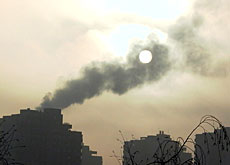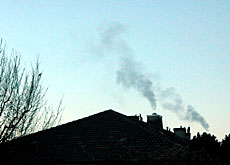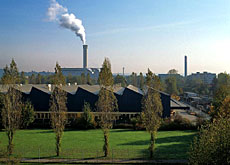Falling emissions fail to stem calls for CO2 tax

The Federal Energy Office has warned that some kind of tax on carbon dioxide emissions is inevitable if Switzerland is to meet global and national targets.
Officials announced on Monday that a fuel efficiency programme had led to a six per cent reduction in CO2 emissions last year, but they said this was not enough.
In its annual report, the Federal Energy Office said carbon dioxide output would have to be cut by 900,000 tons for heating fuel and 2.6 million tons for motor fuel to meet the goals set by Switzerland’s CO2 law, which came into force in May 2000.
The legislation aims to reduce levels by 2010 to ten per cent below what they were in 1990.
To achieve this, Switzerland has pledged to reduce heating fuel emissions by 15 per cent and motor fuel – petrol and diesel – emissions by eight per cent.
The law echoes Switzerland’s commitment to the Kyoto Protocol, which calls for a reduction of greenhouse gas emissions to pre-1990 levels.
Investments
Officials said last year’s fall was partly due to voluntary measures and agreements between the authorities and 600 companies responsible for 25 per cent of the country’s CO2 emissions.
Improved energy efficiency for electrical goods and vehicles accounted for the rest.
They added that SwissEnergy, the government programme for the promotion of renewable energy and more efficient use of energy, had come close to reaching its targets.
SwissEnergy, which costs SFr50 million annually, has generated technology investments worth SFr800 million since it was launched.
Monday’s news will put further pressure on the government, which is currently considering plans to introduce a CO2 tax.
Options on the table include a tax on both heating and motor fuels, or a tax on heating fuel and a levy of one centime per litre on petrol and diesel.
Increased pollution
It is estimated that a CO2 tax could generate revenue of around SFr100 million a year, which could be used to finance measures to reduce emissions. CO2 emissions account for around 80 per cent of all greenhouse gases.
A recent report for the Swiss environment agency predicted that CO2 output from motor fuels would rise by 8.8 per cent by 2010, rather than drop by 8.0 per cent – a difference of 2.6 million tons.
The report took into account growing population trends, stagnating economic growth, heavier traffic and the efficiency of current measures.
C02 emissions from heating fuels, on the other hand, are expected to fall 11.4 per cent – but this is still short of the target of 15 per cent.
swissinfo with agencies
The Kyoto Protocol, which was ratified by Switzerland last year, covers six types of greenhouse gases.
Carbon dioxide accounts for around 80 per cent of these gases.
Swiss legislation calls for carbon dioxide emissions to be cut to ten per cent less than their 1990 level.
To reach this goal, emissions from motor fuel and heating fuel must be cut by 8% and 15% respectively.

In compliance with the JTI standards
More: SWI swissinfo.ch certified by the Journalism Trust Initiative


You can find an overview of ongoing debates with our journalists here . Please join us!
If you want to start a conversation about a topic raised in this article or want to report factual errors, email us at english@swissinfo.ch.